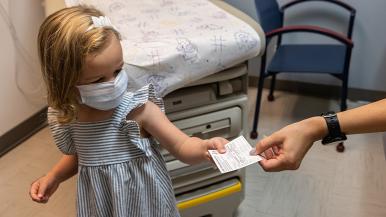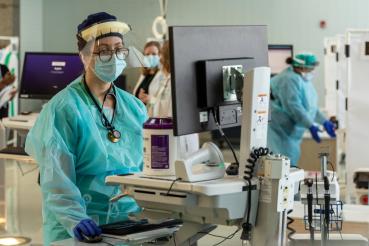Now available at a doctor’s office near you: COVID-19 vaccines for kids under 5.
Days after federal health authorities endorsed them, two COVID-19 vaccines for young children are already en route to doctor’s offices, community health centers and pharmacies.
Rush University Medical Center received its first doses this week, and staff members immediately began offering immunizations for inpatients and children who had scheduled well visits. The vaccine will be rolled over the next week at other RUSH locations.
“We’re working very hard at RUSH to make sure that our patients have access to this vaccine to protect their families, their little ones and help be part of the end of the pandemic,” said Erin Shaughnessy, PharmD, director of pharmacy at Rush University Medical Center.
Do you have questions or concerns about the vaccine? Shaughnessy and Betty Vu, PharmD, clinical pharmacy specialist in Pediatric Infectious Diseases, are here with answers.
Which vaccines are available for children under 5?
Two vaccines are now authorized for use: one from Moderna and another produced by Pfizer and BioNTech. Both are a lower-dose versions of the adult vaccines, and researchers believe that both should show the same type of protection against severe cases of COVID-19 seen in adults.
“It’s a very critical step moving towards the end of the pandemic,” Vu said. ”We’re really excited about it. These mRNA vaccines have been shown to be very effective and well-tolerated in this age group.”
The Moderna vaccine has a simpler two-dose regimen. The Pfizer-BioNTech vaccine has three doses but has potentially higher effectiveness against COVID-19 symptoms, according to clinical trial data.
What are the side effects or risks?
Both vaccines have been shown to be very safe for children under 5 in clinical trials. Side effects typically include the following:
- Redness, pain, and itchiness near the injection site
- Irritability and crying
- Fever
Moderna’s vaccine caused more frequent fevers in children under 6 than adults, but at comparable rates to other early childhood vaccines.
In both trials, researchers didn’t see any cases of myocarditis, a rare inflammation of the heart seen in a very small percentage of older adolescents who received COVID-19 shots. Four children between 16 and 19 months experienced febrile seizures after receiving the Moderna vaccine, but investigators found three were unrelated to the vaccine.
I’m nervous about getting my child the COVID-19 vaccine. Is it really necessary?
It’s very natural to have questions about a vaccine or medicine for your child. COVID-19 tends to be less severe in younger people, but children can still get very sick. Of the 13.5 million children in the United States who have tested positive for COVID-19, more than 40,000 have been hospitalized, and more than 1,000 have died. And even a mild case of COVID-19 can be spread to other vulnerable members in your family and community, so vaccination can protect both your child and other vulnerable people in your life.
Research from Moderna’s and Pfizer-BioNTech’s clinical trials shows that the COVID-19 vaccine for children under 5 is safe and effective at preventing severe illness. Both the Centers for Disease Control and Prevention and the American Academy of Pediatrics recommend that all children six months and older receive the vaccine. Only children who have a history of allergies to any of the ingredients in the vaccines should not take it.
“The vaccine has been approved by our trusted experts at the FDA and the CDC after extensive testing and evaluation,” Shaughnessy said. “While vaccinating your child can be scary, the COVID vaccine is a safe and effective alternative to having your child suffer through a symptomatic COVID infection or spread COVID to family or friends who may develop a symptomatic case.”
Can my child wait and get the vaccine later?
It’s understandable if parents are hesitant about giving their child a newer vaccine. But Vu said research showing the vaccine is safe and effective is strong and that getting the vaccine as soon as possible is the best way to impart the strongest protections.
“For this vaccine, it’s important not to wait and to get it early before the school year starts in the fall,” Vu said. “The Pfizer vaccine is three doses and that’s over 11 weeks. So it will take a long time to get that third dose, which is important if you want your child to receive maximum protection from the vaccine. Parents really need to think about that.”
Do children who have had COVID-19 need the vaccine?
The CDC recommends that all age groups, including children under 5, receive the COVID-19 vaccine, whether or not they’ve previously been had an infection.
“The immunity from a primary infection wanes over time,” Vu said. “Vaccination helps with preventing hospitalization, progression to severe disease and death, and that’s really the more important outcomes that we have to pay attention to.”
My children hate getting shots. How do I prepare them?
- Be honest with your child. In an age-appropriate way, let them know before the visit that they will be getting a shot, that it will hurt for just a second and that you will be there to help them. Let them know that the shot is an important way to stay healthy.
- Bring a special toy, tablet, book. Have them bring something to snuggle with or distract them during the shot.
- Ask about pain relief options and aftercare. Your child’s pediatrician may recommend numbing cream like lidocaine for the shot. At RUSH, Shaughnessy said nurses use “buzzies,” small instruments that use vibrations to dull the sting from the injection. Children’s Tylenol or Motrin may help with any soreness or mild fever after the shot.
- Watch your reactions. Children watch their parents’ emotions carefully. Be positive, excited and upbeat, and treat the shot like a routine part of life — which it is! If you’re afraid of needles, see if your partner or another trusted caregiver can be there for the appointment.
- After the shot, celebrate their bravery with a small treat.
Where can my child get a COVID-19 vaccine?
Vaccines are now being shipped to pediatric practices, pharmacies, community health centers, local health departments, clinics and other locations this week. Parents can reach out to their doctor, nurse, local pharmacy or health department or visit vaccines.gov to see where vaccines for children are available.




